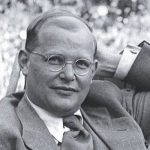 I think we have all thought that the German people were in agreement with the Nazis, but there were, in fact, many German people who fought hard for the other side. One such person who was active in the German resistance was Dietrich Bonhoeffer, who was a Protestant Lutheran Pastor and theologian. He hated Nazism and Hitler’s horrific ideas, and his strong hatred of these things brought him to a place of knowing that he had to do something…anything to stop the murderous regime.
I think we have all thought that the German people were in agreement with the Nazis, but there were, in fact, many German people who fought hard for the other side. One such person who was active in the German resistance was Dietrich Bonhoeffer, who was a Protestant Lutheran Pastor and theologian. He hated Nazism and Hitler’s horrific ideas, and his strong hatred of these things brought him to a place of knowing that he had to do something…anything to stop the murderous regime.
Bonhoeffer was born February 4, 1906 in Breslau, Germany. His family were not religious, but had a strong musical and artistic background. From his childhood days, Bonhoeffer displayed great musical talent, and the pursuit of music was important to him throughout his life. As he grew, I’m sure his family had great plans for his musical future…hoping for him to be a famous musician. When Bonhoeffer turned 14, he announced that he wanted to train and become a priest…a revelation that completely shocked his family.
Despite their displeasure at his announcement, Bonhoeffer attended the University of Berlin, graduating in 1927 with a doctorate in theology for his influential thesis, Sanctorum Communio, which means Communion of Saints. After his graduation, Bonhoeffer spent time in Spain and America. This was likely a good thing, because it gave him a wider outlook on life and helped him move from academic study to a more practical interpretation of the Gospels. He became quite interested in the concept of the Church’s involvement in social justice and protection of those who were oppressed. His wide travels also encouraged a greater interest in ecumenism, which is the outreach to other churches.
At the age of 25, Bonhoeffer was ordained as a priest. Because the early 30’s were a period of great upheaval in Germany, with the instability of Weimar Germany and the mass unemployment of the Great Depression leading to the election of Adolf Hitler in 1933. Hitler was elected as Chancellor in January 1933. He was very charismatic, and therefore, widely welcomed by most of the German people, including large parts of the church, but Bonhoeffer saw through the façade, and remained a firm opponent of Hitler’s philosophy.
Two days after Hitler’s election as Chancellor in Jan 1933, Bonhoeffer made a radio broadcast criticizing Hitler, and in particular the dangers of the idolatrous cult of the Fuhrer. The radio broadcast was almost immediately cut off. Apparently, Hitler already had a large amount of control of the information people received. Being an opponent of Hitler in those days was not looked upon favorably, and unfortunately, they did not have the freedom of speech that we enjoy in the United States.
Many people and even churches were fooled by Hitler, and before they realized it, they had lost the right to do anything about it. Bonhoeffer tried to organize the Protestant Church to reject the Nazi ideology, but they did not listen so he had to breakaway from the church where he was ordained. In April 1933, The Confessing Church which Bonhoeffer helped form with Martin Niemoller, was born. The Confessing Church sought to stand in contrast to the Nazi-supported, German Christian movement. Bonhoeffer felt disillusioned by the weakness of the church and opposition, and in the autumn of 1933, he took a two-year appointment to a German-speaking Protestant church in London.
After two years in London, Bonhoeffer returned to Berlin. He felt like he should be with his native country and  share in its struggles, even if it looked like there was no hope. Shortly after his return, one leader of the Confessing Church was arrested and another fled to Switzerland. Bonhoeffer’s authorization to teach revoked in 1936. He could not teach after being denounced as a pacifist and enemy of the state. Things grew steadily worse, and finally, because of his opposition to the Nazi regime, Bonhoeffer was arrested. He was “sentenced” to death and on April 9, 1945, was executed at the Flossian concentration camp. It was the last month of the war. He had almost survived. He remains an important symbol of opposition to Hitler, and his views on Christianity continue to be influential.
share in its struggles, even if it looked like there was no hope. Shortly after his return, one leader of the Confessing Church was arrested and another fled to Switzerland. Bonhoeffer’s authorization to teach revoked in 1936. He could not teach after being denounced as a pacifist and enemy of the state. Things grew steadily worse, and finally, because of his opposition to the Nazi regime, Bonhoeffer was arrested. He was “sentenced” to death and on April 9, 1945, was executed at the Flossian concentration camp. It was the last month of the war. He had almost survived. He remains an important symbol of opposition to Hitler, and his views on Christianity continue to be influential.


Leave a Reply